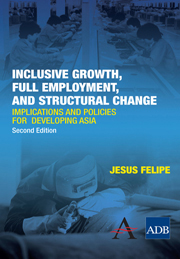 Inclusive Growth, Full Employment, and Structural Change
Inclusive Growth, Full Employment, and Structural Change Book contents
- Frontmatter
- Contents
- Illustrations
- Abbreviations
- Foreword
- Preface and Acknowledgments
- Executive Summary
- Chapter 1 What Is Inclusive Growth?
- Chapter 2 What Is the Main Constraint that Developing Countries Face?
- Chapter 3 Why Full Employment and Who Should Be Responsible for Trying to Achieve It?
- Chapter 4 Why Is Growth Unstable?
- Chapter 5 What Is the Role of Agriculture in the Process of Structural Change and in Delivering Full Employment? Full Employment I
- Chapter 6 What Is the Role of Investment in Delivering Full Employment? Full Employment II
- Chapter 7 Why Is “Planning Development” Necessary?
- Chapter 8 What Is Industrial Policy? Full Employment III
- Chapter 9 Structural Transformation, Industrialization, and Technological Change in Developing Asia: What Does the Empirical Evidence Show?
- Chapter 10 Why Do Export Diversification and Sophistication Matter?
- Chapter 11 Unemployment Versus Inflation: Which One Should Be the Public Enemy Number One?
- Chapter 12 What Should Be the Role of Fiscal and Monetary Policies for Development? Full Employment IV
- Chapter 13 Is It Possible to Achieve Full Employment in the Presence of Structural Transformation?
- Chapter 14 Should the Government (Public Sector) Intervene Directly and Become the Employer of Last Resort? Full Employment V
- Chapter 15 Can Competitiveness and Globalization Deliver Inclusiveness and Full Employment?
- Chapter 16 Export-Led Growth or Domestic Demand–Led Growth?
- Chapter 17 Is Education a Key Ingredient of Inclusive Growth?
- Chapter 18 Conclusions: How Can Developing Countries Implement an Inclusive-Growth and Full-Employment Strategy?
- References
- Author Index
- Subject Index
Chapter 11 - Unemployment Versus Inflation: Which One Should Be the Public Enemy Number One?
- Frontmatter
- Contents
- Illustrations
- Abbreviations
- Foreword
- Preface and Acknowledgments
- Executive Summary
- Chapter 1 What Is Inclusive Growth?
- Chapter 2 What Is the Main Constraint that Developing Countries Face?
- Chapter 3 Why Full Employment and Who Should Be Responsible for Trying to Achieve It?
- Chapter 4 Why Is Growth Unstable?
- Chapter 5 What Is the Role of Agriculture in the Process of Structural Change and in Delivering Full Employment? Full Employment I
- Chapter 6 What Is the Role of Investment in Delivering Full Employment? Full Employment II
- Chapter 7 Why Is “Planning Development” Necessary?
- Chapter 8 What Is Industrial Policy? Full Employment III
- Chapter 9 Structural Transformation, Industrialization, and Technological Change in Developing Asia: What Does the Empirical Evidence Show?
- Chapter 10 Why Do Export Diversification and Sophistication Matter?
- Chapter 11 Unemployment Versus Inflation: Which One Should Be the Public Enemy Number One?
- Chapter 12 What Should Be the Role of Fiscal and Monetary Policies for Development? Full Employment IV
- Chapter 13 Is It Possible to Achieve Full Employment in the Presence of Structural Transformation?
- Chapter 14 Should the Government (Public Sector) Intervene Directly and Become the Employer of Last Resort? Full Employment V
- Chapter 15 Can Competitiveness and Globalization Deliver Inclusiveness and Full Employment?
- Chapter 16 Export-Led Growth or Domestic Demand–Led Growth?
- Chapter 17 Is Education a Key Ingredient of Inclusive Growth?
- Chapter 18 Conclusions: How Can Developing Countries Implement an Inclusive-Growth and Full-Employment Strategy?
- References
- Author Index
- Subject Index
Summary
In chapters 5 and 6, I argued that inflation can potentially damage developing countries because it erodes the purchasing power of wages and shifts the burden of financing development to workers. This is unethical and conflicts with the idea of inclusive growth. In this chapter, I address the following three questions: (i) Can full employment be achieved without inflation? (ii) How high does inflation have to be to represent a serious problem? (iii) What causes inflation? This discussion serves as prologue to the discussion of monetary and fiscal policies in the next chapter. As the discussion in chapter 6 made clear, price increases that lead to real wage reductions (especially for the workers at the bottom of the wage distribution, for whom low inflation is a public good of special importance) are inconsistent with the notion of inclusive growth, and measures should be taken to combat it.
Unemployment and Inflation
Many economists have long accepted that a trade-off exists between unemployment and inflation (rate of change of money wages). This trade-off is summarized statistically in the Phillips curve. The degree of trade-off and the interpretation varies depending on the theory. Perhaps with the exception of the New Classicals (who think that the trade-off is an illusion), most economists believe in some sort of Phillips curve, namely, that unemployment will fall if demand expands faster than the economy's long-run productive capacity, and that if demand keeps on expanding faster than the economy's long-run productive capacity then, in the long run, inflation will rise.
- Type
- Chapter
- Information
- Inclusive Growth, Full Employment, and Structural ChangeImplications and Policies for Developing Asia, pp. 179 - 188Publisher: Anthem PressPrint publication year: 2010


